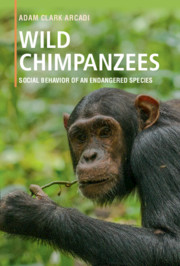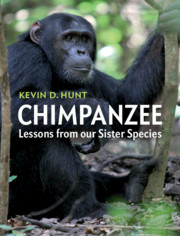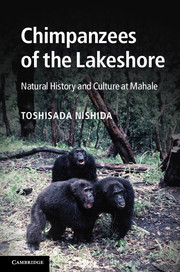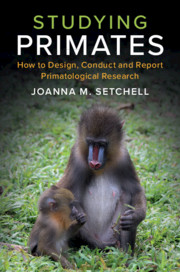Wild Chimpanzees
Social Behavior of an Endangered Species
£36.99
- Author: Adam Clark Arcadi, Cornell University, New York
- Date Published: June 2018
- availability: In stock
- format: Paperback
- isbn: 9781316647561
£
36.99
Paperback
Other available formats:
Hardback, eBook
Looking for an inspection copy?
This title is not currently available on inspection
-
As our closest primate relatives, chimpanzees offer tantalizing clues about the behavior of early human ancestors. This book provides a rich and detailed portrait of chimpanzee social life in the wild, synthesizing hundreds of thousands of hours of research at seven long-term field sites. Why are the social lives of males and females so different? Why do groups of males sometimes seek out and kill neighboring individuals? Do chimpanzees cooperate when they hunt monkeys? Is their vocal behaviour like human speech? Are there different chimpanzee 'cultures'? Addressing these questions and more, Adam Arcadi presents a fascinating introduction to the chimpanzee social universe and the challenges we face in trying to save this species from extinction. With extensive notes organized by field site and an appendix describing field methods, this book is indispensable for students, researchers, and anyone else interested in the remarkable and complex world of these intelligent apes.
Read more- Synthesizes research from all the long-term chimpanzee field projects, offering a unique species-wide and site-wide perspective
- The concise and readable text ensures the book is accessible, while citations and extensive endnotes are useful for those who want to look deeper into the literature
- Emphasizes the conservation plight of chimpanzees and the importance of long-term scientific research projects for conservation
Reviews & endorsements
'… the first book to compile the available information about field studies of wild chimpanzees. To do so has required an immense effort on the part of the author, Adam Clark Arcadi. The long-term field studies at Gombe, Kibale, Budongo, Mahale, Bossou, and Tai, together with a large number of shorter term studies, are synthesised on a topic by topic basis. This gives the reader an overall perspective of wild chimpanzees which has hitherto been lacking. We see many features of behaviour and social organisation that all chimps have in common. And we also see ecological and cultural differences between different chimp communities across Africa. … a good book for all those seeking to understand our closest relatives in the animal kingdom: undergraduates in particular will benefit from this synthesis of all that is known at the present time. [Simultaneously], the author writes well so his book is accessible to the general reader.' Vernon Reynolds, University of Oxford
See more reviews'Wild Chimpanzees is a superbly original and incisive overview of the behavior, ecology and conservation of a critically important species. Arcadi provides a broad primate context for his synthesis, presents a rich history of the main field-sites and the behavioral differences associated with them, and explores the evolutionary significance of numerous types of cooperation, competition and communication. Arcadi's clarity of exposition, systematic consideration and crisp thinking make this an invaluable source for students and professionals alike.' Richard Wrangham, Harvard University, Massachusetts
'Arcadi's Wild Chimpanzees weaves new research on the social behavior of wild chimpanzees into an accessibly written account of our closest relatives. Highly recommended for the library of anyone interested in new frontiers of great ape research.' Craig Stanford, University of Southern California
'… along with the clear explanations that are rooted in theory, makes this a perfect volume to assign in undergraduate courses in primatology. In fact, I used this book for an undergraduate seminar on chimpanzee behavioral ecology. One reason that the students enjoyed this volume was that Arcadi provides an objective voice … I think this is very well suited for an academic's bookshelf …' Zarin Machanda, The Quarterly Review of Biology
Customer reviews
Not yet reviewed
Be the first to review
Review was not posted due to profanity
×Product details
- Date Published: June 2018
- format: Paperback
- isbn: 9781316647561
- length: 244 pages
- dimensions: 228 x 153 x 14 mm
- weight: 0.44kg
- contains: 4 b/w illus. 14 colour illus. 7 tables
- availability: In stock
Table of Contents
Preface
1. Primates, apes, and the study of chimpanzee social behavior
2. Seven long-term field studies
3. Chimpanzee fission-fusion social organization and its conservation implications
4. Sex differences in ranging and association patterns
5. Female social relationships and the defining influence of offspring care
6. Male social relationships and the dynamic interplay of competition and cooperation
7. Sexual behavior: conflicting strategies of males and females
8. Coalitionary lethal aggression between and within communities
9. Hunting, eating, and sharing meat
10. Communication: the form and content of signals
11. Community differences in grooming postures and tool use: innovation, social learning, and the question of 'culture'
Epilogue
Appendix: field methods for studying wild chimpanzees.
Sorry, this resource is locked
Please register or sign in to request access. If you are having problems accessing these resources please email [email protected]
Register Sign in» Proceed
You are now leaving the Cambridge University Press website. Your eBook purchase and download will be completed by our partner www.ebooks.com. Please see the permission section of the www.ebooks.com catalogue page for details of the print & copy limits on our eBooks.
Continue ×Are you sure you want to delete your account?
This cannot be undone.
Thank you for your feedback which will help us improve our service.
If you requested a response, we will make sure to get back to you shortly.
×







